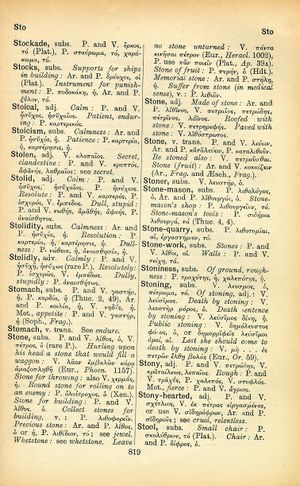stone
καλῶς γέ μου τὸν υἱὸν ὦ Στιλβωνίδη εὑρὼν ἀπιόντ' ἀπὸ γυμνασίου λελουμένον οὐκ ἔκυσας, οὐ προσεῖπας, οὐ προσηγάγου, οὐκ ὠρχιπέδισας, ὢν ἐμοὶ πατρικὸς φίλος → Ah! Is this well done, Stilbonides? You met my son coming from the bath after the gymnasium and you neither spoke to him, nor kissed him, nor took him with you, nor ever once felt his balls. Would anyone call you an old friend of mine?
English > Greek (Woodhouse)
subs.
P. and V. λίθος, ὁ, V. πέτρος, ὁ (rare P.).
Hurling upon his head a stone that would fill a waggon: V. λᾶαν ἐμβαλὼν κάρᾳ ἁμαξοπληθῆ (Eur., Phoen. 1157).
Stone for throwing: also V. χερμάς, ἡ;
Round stone for rolling on to an enemy: P. ὀλοίτροχος, ὁ (Xen.).
Stone for building: P. and V. λίθος, ὁ.
Collect stones for building, v.: P. λιθοφορεῖν.
Precious stone: Ar. and P. λίθος, ὁ or ἡ, P. λιθίδιον, τό; see jewel.
Whetstone: see whetstone.
Leave no stone unturned: V. πάντα κινῆσαι πέτρον (Eur., Heracl. 1002), P. use πᾶν ποιεῖν (Plat., Ap. 39A).
Stone of fruit: P. πυρήν, ὁ (Hdt.).
Memorial stone: Ar. and P. στήλη, ἡ.
Suffer from stone (in medical sense), v.: P. λιθιᾶν.
adj.
Made of stone: Ar. and P. λίθινος, V. πετραῖος, πετρώδης, πέτρινος, λάινος.
Roofed with stone: V. πετρηρεφής.
Paved with stone: V. λιθόστρωτος.
v. trans.
P. and V. λεύειν, Ar. and P. καταλεύειν, P. καταλιθοῦν.
Be stoned also: V. πετροῦσθαι.
Stone (fruit): Ar. and V. κοκκίζειν (Ar., Frag. and Aesch., Frag.).

